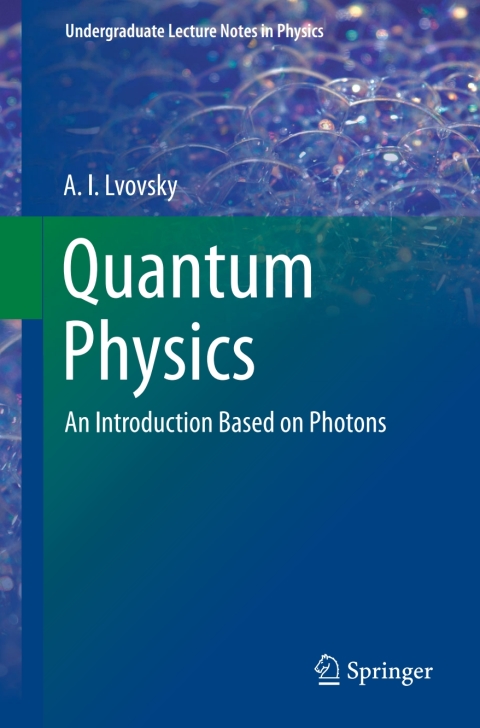Description
Efnisyfirlit
- Preface
- Why I wrote this book?
- Quantum mechanics or quantum optics?
- Structure of the course
- How to use this book (a message to the student)
- Acknowledgements
- Contents
- 1 The quantum postulates
- 1.1 The scope of quantum mechanics
- 1.2 The Hilbert Space Postulate
- 1.3 Polarization of the photon
- 1.4 Quantum measurements
- 1.4.1 The Measurement Postulate
- 1.4.2 Polarization measurements
- 1.5 Quantum interference and complementarity
- 1.6 Quantum cryptography
- 1.6.1 The BB84 protocol
- 1.6.2 Practical matters in quantum cryptography
- 1.7 Operators in quantum mechanics
- 1.8 Projection operators and unnormalized states
- 1.9 Quantum observables
- 1.9.1 Observable operators
- 1.9.2 Mean value and uncertainty of an observable
- 1.9.3 The uncertainty principle
- 1.10 Quantum evolution
- 1.11 Problems
- 2 Entanglement
- 2.1 Tensor product spaces
- 2.1.1 Tensor product states and entangled states
- 2.1.2 Measurements in tensor product spaces
- 2.1.3 Tensor products of operators
- 2.1.4 Local operators
- 2.2 Local measurements of entangled states
- 2.2.1 Remote state preparation
- 2.2.2 Partial inner product
- 2.2.3 Local measurements and causality
- 2.2.4 Mixed states
- 2.3 Quantum nonlocality
- 2.3.1 Einstein–Podolsky–Rosen paradox
- 2.3.2 The Bell inequality
- 2.3.3 Violation of the Bell inequality
- 2.3.4 Greenberger–Horne–Zeilinger (GHZ) nonlocality
- 2.4 An insight into quantum measurements
- 2.4.1 Von Neumann measurements
- 2.4.2 Decoherence
- 2.4.3 Interpretations of quantum mechanics
- 2.4.4 The superposition tree
- 2.5 Quantum computation
- 2.6 Quantum teleportation and its applications
- 2.6.1 Quantum teleportation
- 2.6.2 Quantum repeater
- 2.7 Problems
- 3 One-dimensional motion
- 3.1 Continuous observables
- 3.2 De Broglie wave
- 3.3 Position and momentum bases
- 3.3.1 Conversion between position and momentum bases
- 3.3.2 Position–momentum uncertainty
- 3.3.3 The original Einstein–Podolsky–Rosen paradox
- 3.4 The free space potential
- 3.5 Time-independent Schrödinger equation
- 3.6 Bound states
- 3.7 Unbound states
- 3.7.1 The single-step potential
- 3.7.2 Quantum tunnelling
- 3.8 Harmonic oscillator
- 3.8.1 Annihilation and creation operators
- 3.8.2 Fock states
- 3.8.3 Coherent states
- 3.9 Heisenberg picture
- 3.9.1 Operator evolution
- 3.9.2 Displacement operator
- 3.9.3 Evolution of probability densities
- 3.10 Transformations of harmonic oscillator states
- 3.10.1 Coherent state as displaced vacuum
- 3.10.2 Phase shift
- 3.10.3 Squeezing
- 3.11 Problems
- 4 Angular momentum
- 4.1 3D motion
- 4.2 Rotationally symmetric potential
- 4.2.1 Spherical coordinates
- 4.2.2 Angular momentum
- 4.3 Angular momentum eigenstates
- 4.3.1 Matrix representation of the angular momentum
- 4.3.2 Wavefunctions of angular momentum eigenstates
- 4.3.3 Spin
- 4.4 The hydrogen atom
- 4.4.1 Radial wavefunctions
- 4.4.2 Energy spectrum and transitions
- 4.4.3 The periodic table
- 4.5 The Bloch sphere
- 4.6 Magnetic moment and magnetic field
- 4.6.1 Angular momentum and magnetic moment
- 4.6.2 Stern–Gerlach apparatus
- 4.6.3 Evolution of magnetic states
- 4.7 Magnetic resonance
- 4.7.1 Rotating basis
- 4.7.2 Evolution under the rotating-wave approximation
- 4.7.3 Pulse area
- 4.7.4 Applications of magnetic resonance
- 4.8 Problems
- 5 Quantum physics of complex systems
- 5.1 The density operator
- 5.1.1 Pure and mixed states
- 5.1.2 Diagonal and off-diagonal elements
- 5.1.3 Evolution
- 5.2 Trace
- 5.3 Partial trace
- 5.4 Density matrix and Bloch vector
- 5.5 Density matrix and magnetic resonance
- 5.5.1 Decoherence
- 5.5.2 Thermalization
- 5.5.3 Relaxation and the Bloch vector
- 5.6 Generalized measurements
- 5.6.1 A realistic detector
- 5.6.2 Positive operator-valued measure (POVM)
- 5.7 Quantum tomography
- 5.7.1 Quantum state tomography
- 5.7.2 Quantum process tomography
- 5.7.3 Quantum detector tomography
- 5.8 Problems
- Appendix A Linear algebra basics
- A.1 Linear spaces
- A.2 Basis and dimension
- A.3 Inner Product
- A.4 Orthonormal Basis
- A.5 Adjoint Space
- A.6 Linear Operators
- A.6.1 Operations with linear operators
- A.6.2 Matrices
- A.6.3 Outer products
- A.7 Adjoint and self-adjoint operators
- A.8 Spectral decomposition
- A.9 Commutators
- A.10 Unitary operators
- A.11 Functions of operators
- Appendix B Probabilities and distributions
- B.1 Expectation value and variance
- B.2 Conditional probabilities
- B.3 Binomial and Poisson distributions
- B.4 Probability densities
- Appendix C Optical polarization tutorial
- C.1 Polarization of light
- C.2 Polarizing beam splitter
- C.3 Waveplates
- Appendix D Dirac delta function and the Fourier transformation
- D.1 Dirac delta function
- D.2 Fourier transformation
- Index







Reviews
There are no reviews yet.